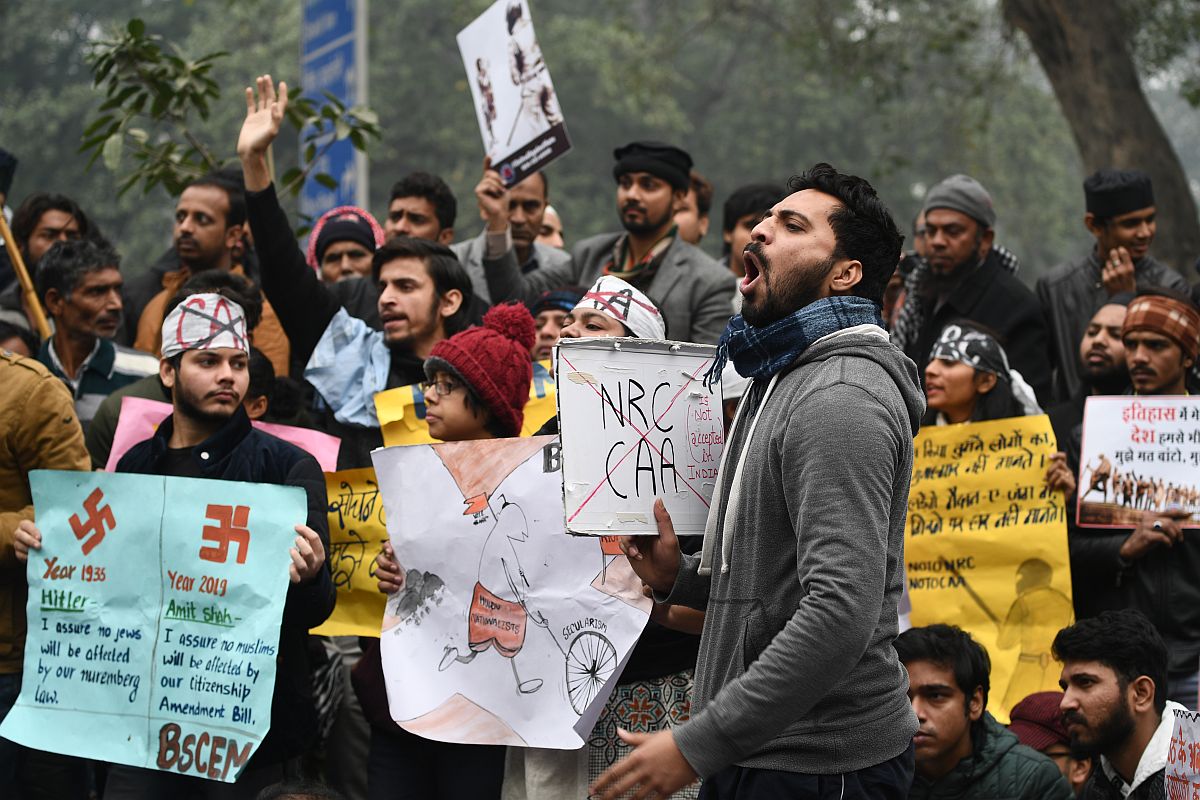Drunk riders fall off flyover in Delhi
A tragic accident occurred on Geeta Colony flyover, resulting in one fatality and another person sustaining serious injuries, police said on Sunday.
Defying prohibitory orders, protesters marched on to the streets in UP, parts of Delhi, Karnataka, Madhya Pradesh and six other states in a bid to bring national and international attention to their fight against the controversial law.

Protesters shout slogans at a demonstration against the new citizenship law in New Delhi. (Photo: AFP)
At least three people were killed and several injured in protests across the country on Thursday against the controversial Citizenship (Amendment) Act.
Defying prohibitory orders, protesters marched on to the streets in Uttar Pradesh, parts of Delhi, Karnataka, Madhya Pradesh and six other states in a bid to bring national and international attention to their fight against the controversial law.
Advertisement
Two deaths were reported from BJP-ruled Karnataka’s Mangaluru as police opened fire on the angry protesters. Also, 20 policemen were reportedly injured in the Thursday protests.
Advertisement
In Uttar Pradesh’s Lucknow, a man died allegedly due to a firearm injury he sustained during the protests.
Almost all the country’s major cities – Delhi, Bengaluru, Kolkata, Chennai, Lucknow, Patna, Thiruvananthapuram, and Hyderabad – saw protesters on the streets despite substantial police presence and imposition of Section 144 at several places.
In Delhi, protesters gathered in large numbers at various places like the Red Fort, Mandi House and Jantar Mantar. Police forces deployed in large numbers kept the protests under control.
The Delhi-Gurgaon route was gridlocked as vehicles lined up for kilometres on the expressway connecting the two adjoining cities. To stop protesters from reaching Delhi from Gurgaon, Delhi Police placed barricades on the border in a bid to check vehicles, which threw traffic out of gear on the entire stretch.
Voice, messaging and Internet services by Airtel, Vodafone Idea and Reliance Jio were suspended in various parts of Delhi-NCR.
A slew of Opposition leaders including Sitaram Yechury, D Raja, Nilotpal Basu, Brinda Karat, Ajay Maken and Sandeep Dikshit, and activists including Yogendra Yadav, Prashant Bhushan and Umar Khalid, were among many who were detained near the Red Fort and Mandi House – the sites of two planned protests against the “unconstitutional” CAA and police crackdown on students.
At least 20 metro stations were shut as a precautionary measure in the national capital.
Meanwhile, Internet services have been suspended in Meerut and Bareilly following the violent protests over the Citizenship Amendment Act in the state. Mobile internet services have been suspended in Ghaziabad for 24 hours from 10 pm on Thursday in view of violent protests against the new citizenship law in parts of Uttar Pradesh.
Uttar Pradesh witnessed some of the worst protest-related violence, where media persons were attacked and OB vans were razed in Lucknow. Similar acts of violence and arson were reported from places such as Sambhal in the state.
Authorities have suspended internet services in Lucknow for 45 hours from 3 pm on Thursday.
Karnataka’s Bengaluru and Mangaluru also witnessed massive protests, where also demonstrators were detained including historian Ramachandra Guha.
Police fired teargas shells and carried out a baton charge to disperse 100 anti-CAA protesters who allegedly turning violent, setting a few motor bikes on fire and pelting stones on security forces in Mangaluru.
Curfew has been extended to entire Mangaluru City Commissionerate from 6 pm Thursday till midnight on December 22.
Mobile internet services in Mangaluru and Dakshina Kannada districts were suspended on Thursday night for the next 48 hours after two people were killed allegedly in police firing.
Protests in Hyderabad were foiled by the Telangana Police who whisked away the protesters. At least 50 people were taken into custody in the South Zone of the city.
Gujarat’s Ahmedabad also witnessed protests against the Citizenship Amendment Act. Police resorted to lathi-charge during a protest called by different Left parties. The protesters were allegedly blocking police vehicles when the police resorted to lathi-charge to disperse them.
Meanwhile, the Ahmedabad Police has detained 49 people in connection with violence during protests.
Maharashtra also witnessed protests in Mumbai and several other places in the state.
In Mumbai, the biggest procession was held at the historic August Kranti Maidan which saw a large number of celebs and political leaders like Raj Babbar, Naseem Khan, Milind Deora, Eknath Gaikwad, film personalities – Rahul Bose, Swara Bhasker, Saeed Mirza, Suhasini Mulay, Farhan Akhtar, and Sushant Singh, academicians, social workers, representatives of NGOs, students, and many more sitting in protest against the CAA-NRC.
Nagpur, which is the headquarters of the RSS, also witnessed a big protest march by citizens’ groups.
In Rajasthan, protests were held in several districts including the capital city Jaipur where thousands belonging to the Left parties, lawyers fraternity, CIPU, People’s Union for Civil Liberties (PUCL), civil society, teachers, professors and many other organisations came together to take out a massive protest march against the Citizenship Amendment Act.
In Kerala’s Thiruvananthapuram, police used water cannons on students protesting against the law.
However, the protests drew a mixed response in Bihar and were largely muted in Madhya Pradesh. Some protests were also reported from Uttarakhand and Jharkhand.
Protests against CAA that were earlier confined to the northeast, have swept the country over the past week after several protesters, including students clashed with the police in Delhi’s Jamia Milia Islamia on December 15.
The amended law seeks to provide citizenship to Hindu, Sikh, Buddhist, Jain, Parsi and Christian communities who have faced religious persecution in Pakistan, Bangladesh, and Afghanistan and have arrived in India on or before December 31, 2014.
The nationwide protests also come a day after the Supreme Court refused to stop the implementation of the amended law and issued a notice to the Centre while hearing nearly 60 petitions challenging the recent amendments to the Citizenship Act. The top court also asked the central government to respond to the pleas by the second week of January.
Advertisement